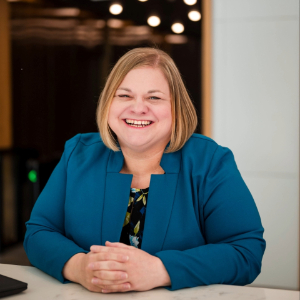Caregiving and the Sandwich Generation

Many of our clients are feeling “sandwiched” between caring for their kids and their aging family members at the same time they are balancing working, saving for retirement, and living their own lives.
As part of our Thriving After Divorce Speaker Series, Mary Molnar, occupational therapist and co-owner of Senior Care Authority - Greater Cleveland, presented on this very important topic of what is the sandwich generation and how we can manage it better.
What is the sandwich generation?
The sandwich generation is defined as a group of people typically in their 40s and 50s who are raising their children (or still providing financial support - like if you have kids in college) while also caring for their aging parents or other family members.
According to Pew Research, more than half of Americans in their 40s are “sandwiched” between their children and an aging parent and are providing physical, financial, and emotional care to both generations.
This sandwich generation often experiences higher levels of stress. And with the increase in college-age kids living at home and the rising costs of in-home senior care or assisted living, people in the sandwich generation are finding themselves financially responsible for both their kids and their aging parents. If not managed, this can significantly impact their own financial future and personal well-being.
How can you better manage being a caregiver?
Here are five ways that can help ease the stress of feeling sandwiched between your children and your parents.
1. Care for yourself first.
This may sound impossible because you’re thinking who has time for that, but it’s so important to care for yourself first. If your cup is empty, then there is nothing left to share with others. Self-care is essential so that you can effectively support your loved ones. Of course you need to take care of your health needs first - don’t skip your medical and dental appointments!
But in addition to those necessary appointments, it’s important that you do something relaxing that you enjoy. Something that can help relieve some of the stress you are likely feeling. It could be sitting in a quiet place for a few minutes each day, taking a walk outside, listening to a short podcast, reading a chapter in a book, meditating, doing a few yoga poses - whatever makes you feel relaxed.
It’s also essential to set clear boundaries so everyone knows what you can and cannot do and remember that it’s okay (and necessary) to say no sometimes.
2. Get financial clarity.
It’s not always easy to talk about money, but if you’re in a caregiving role, it’s very important to talk to both your parents and your children (if they are older). Share your own financial situation and set limits on what you’re able to contribute financially.
It’s also essential to understand what your parents can contribute to their own care. Some older adults think holding onto their money for future generations is what they want to do, when really their money can be better spent helping pay for their own care right now.
When it comes to finances, you may also want to consult a financial planner and estate planning attorney for professional guidance.
3. Communicate with your family.
If you have siblings, you may feel like you’re the only one taking care of your aging parents, which can quickly become extremely frustrating and cause relationship issues within your family. Before the frustration even begins, set up a family meeting to discuss what role each person can have in caregiving.
Maybe one sibling can contribute more financially and the other takes care of transportation to and from doctors’ appointments. Even if a sibling lives out of town, they can help make appointments and take care of any other phone calls that need to be made. You won’t know how people can help until you ask.
4. Get help.
It’s so important to ask for help when you need it and even before you need it if you can. If you wait until you’re feeling stressed, help can be harder to find.
Get creative when thinking about other family members who can help out. Children, nieces, nephews, and family friends can help with meals, errands, providing companionship, assisting with household chores, and more.
Caregiving does not have to be (and should not be) a one-person job. A team approach usually works best and can help reduce the chance of burnout and stress on one person. There are many professionals and organizations who provide services specifically to help with caregiving challenges and responsibilities. They are the experts so enlist their help if you need to. We have provided some helpful links to resources at the end of this post.
5. Know your rights as an employee.
If you are working full-time outside the home, it’s important to know your rights when taking time off to care for family members.
The Family and Medical Leave Act (FMLA) is a federal law that allows you to take time off from work when you need to care for an aging parent or other family member. You can take up to 12 weeks unpaid leave during a 12-month period without losing your job or employer-provided health insurance. Keep in mind that under the Act, the relative must be an immediate family member, which includes a parent, spouse, or child.
Caring for two generations can be stressful and challenging. If you feel like you need help outside of your family and friends, there are many programs and organizations that are very experienced in helping you navigate through these challenges. We have included some links to helpful resources below.
Additional Resources
https://www.seniorcareauthority.com/locations/cleveland-oh/
https://www.aarp.org/caregiving/
If the aging person was a veteran, check https://www.aidandattendance.com/ to see if they qualify for Veterans Benefits. You can also contact your local Veterans Service Commission.
We have worked with many clients who are navigating the sandwich generation. If you’re worried about your financial future and want to make sure you protect it, we are here to help.



